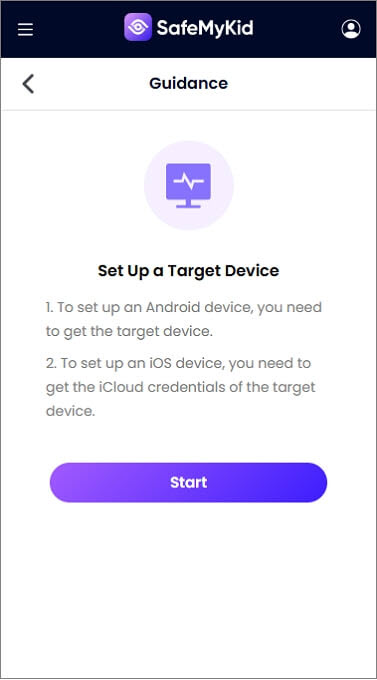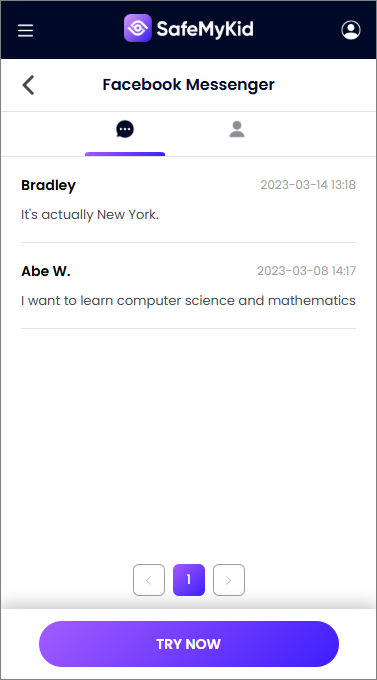How Can I Find Out Who My Boyfriend Is Talking to on Messenger: Signs and Approaches for Relationship Clarity

The question "how can I find out who my boyfriend is talking to on Messenger" often stems from one of the most emotionally distressing experiences in a relationship, creating a complex mixture of uncertainty, insecurity, and suspicion that affects every aspect of your connection.

When concerns about messaging habits arise, distinguishing between normal digital privacy and potential secretive behavior becomes crucial for addressing issues effectively.
Why "How Can I Find Out Who My Boyfriend Is Talking to on Messenger" Becomes a Common Concern
If you're asking, "How can I find out who my boyfriend is talking to on Messenger?"——you're not alone. Relationship doubts often arise from subtle behavior shifts that create emotional distance and spark questions.
Common triggers include sudden screen-guarding habits, an unusually high interest in privacy, or quick app switching when you're nearby. These actions can lead anyone to wonder if something is being hidden on Messenger.
Sometimes, these concerns come from past experiences——such as previous dishonesty or unresolved trust issues——that heighten your sensitivity. Other times, existing relationship tension may make normal chatting seem suspicious.
Before jumping to conclusions, it's important to evaluate the situation calmly, identify patterns, and consider open communication, or opt for clarity through respectful digital transparency tools.
SafeMyKid - The Most Reliable Solution When You Need to Know Who Your Boyfriend Is Talking to on Messenger

When the question "how can I find out who my boyfriend is talking to on Messenger" creates ongoing distress without resolution through communication, some couples implement verification tools as part of a transparent agreement to rebuild trust.
SafeMyKid offers a comprehensive monitoring solution that provides objective clarity during challenging relationship periods.
Although primarily marketed for parental monitoring, its features can serve as a mutual verification tool when both partners agree to transparency measures during the rebuilding of trust.
The application works across both Android and iOS devices, providing message monitoring, social media surveillance, and digital activity tracking that can help confirm whether concerns are founded or can be put to rest through factual verification.
Key Features of SafeMyKid to Know Who Your Boyfriend Is Talking to on Messenger
When struggling with questions about who your boyfriend is talking to on Messenger, SafeMyKid offers several features that can provide clarity as part of a mutual transparency agreement:
- Complete Messenger Chat Access
View all incoming and outgoing messages on Facebook Messenger, including hidden or archived threads. - Deleted Message Recovery
Retrieve deleted conversations and see what was erased from Messenger, even if it's no longer visible on the device. - Real-Time Chat Monitoring
Watch conversations update in real-time as they happen, without the need to refresh or sync manually. - Messenger Call Logs
Access audio and video call logs from Messenger, including timestamps and call durations. - Contact List Insights
See the full list of Messenger contacts, including newly added friends or contacts not saved in the phone. - Chat Nickname and Emoji Tracking
Track customized nicknames, emojis, and themes used in conversations——often used in private or romantic chats. - Message Timestamp Visibility
Know exactly when each message was sent, delivered, and read. - Shared Media Viewer
Browse through photos, videos, audio clips, and voice notes exchanged through Messenger. - Group Chat Activity
Monitor participation and interaction in Messenger group chats——see who's active, muted, or left recently. - Location Sharing Alerts
If Messenger location sharing is used, get alerts and track shared locations instantly.
These verification capabilities provide objective evidence that supports either confirming concerns or rebuilding trust based on factual clarity rather than continued suspicion.
How to Set up SafeMyKid to Know Who Your Boyfriend Is Talking to on Messenger
Implementing SafeMyKid for Messenger monitoring requires careful setup to ensure comprehensive surveillance while maintaining discretionary operation.
Step 1. Create Your SafeMyKid Monitoring Account
Visit the SafeMyKid website to establish your relationship monitoring account with appropriate features for comprehensive surveillance.

Step 2. Set up SafeMyKid on Boyfriend's Device
For Android: Install SafeMyKid directly on your boyfriend's device during brief unsupervised access to enable comprehensive monitoring capabilities.
For iOS: Use iCloud credentials to enable monitoring without physical access to the device while maintaining complete surveillance functionality.

Step 3. Begin to Know Who Your Boyfriend Is Talking to on Messenger
Access your secure dashboard to review messages, contacts, social media activities, and all other evidence related to potential concerning Messenger communications.

When implemented properly with legal device access, SafeMyKid provides definitive evidence about Messenger activities, eliminating uncertainty and enabling informed decisions about your relationship's future.
6 Common Signs That Raise Concerns about Who Your Boyfriend Is Talking to on Messenger

These behavioral patterns often trigger the question "how can I find out who my boyfriend is talking to on Messenger," though they should be considered as potential indicators rather than definitive proof.
1. Messenger Behavior and Phone Secrecy
When wondering who your boyfriend is talking to on Messenger, significant shifts in how he interacts with the app often represent the first noticeable changes within the relationship.
Potential indicators include:
- Password changes on previously accessible devices
- Position the phone screen away from your view
- Quickly closing Messenger when you approach
- Unusual notification patterns at specific times
- Deleting message threads or conversation history
- Visible tension when Messenger notifications appear
- Leaving the room to respond to messages
These digital privacy increases become particularly significant when they represent a change from previous sharing patterns rather than long-established personal boundaries.
The Messenger app often provides the first concrete indicators of potential communication concerns, explaining why notification reactions frequently trigger initial suspicions in modern relationships.
2. Communication and Emotional Changes
In today's connected world, changes in general communication patterns often accompany concerns about who your boyfriend is talking to on Messenger due to the emotional impact of digital relationships.
Concerning communication patterns include:
- Decreased sharing of daily experiences and feelings
- Emotional withdrawal or unusual distance
- Defensiveness when asked about routine matters
- Increased criticism or finding fault with you
- Unexplained mood swings after checking Messenger
- Reduced interest in couple activities previously enjoyed
- Comparing your relationship to others more frequently
These changes may appear as a general pulling away from the relationship emotionally, creating a sense of disconnection that feels different from normal relationship fluctuations or temporary stress responses.
3. Schedule Changes and Unexplained Time
When concerned about who your boyfriend is talking to on Messenger, unexplained changes in availability and routine often create some of the most tangible evidence for concern.
Time-related warning signs include:
- Responding to messages at unusual hours
- New activities or commitments without much detail
- Unexplained absences or unaccounted time periods
- Difficulty reaching him during specific time blocks
- Vague explanations that change when questioned
- Friends who seem uncomfortable when mentioning his whereabouts
- Excuses to be alone with his phone for extended periods
These schedule disruptions typically create opportunities for potential inappropriate communications, making them particularly significant when they coincide with other warning signs like emotional distance or digital secrecy.
While schedule changes alone might have innocent explanations, patterns of unexplained time combined with defensive responses to questions often strengthen suspicions about hidden Messenger conversations.
4. Relationship Investment Changes
Significant shifts in relationship commitment sometimes contribute to questions about who your boyfriend is talking to on Messenger when they appear alongside other concerning patterns.
Relationship-related changes might include:
- Delayed responses to your messages while actively online
- Reduced future planning or commitment discussions
- Decreased interest in relationship milestones
- Less enthusiasm about shared activities or plans
- Withdrawal from integration with friends and family
- Reduced effort in maintaining the connection during separation
- Inconsistent expressions of affection or commitment
While relationship dynamics naturally evolve, these changes raise concerns when they seem to indicate decreased investment rather than natural relationship maturation.
The significance lies in whether these changes represent normal relationship ebbs or appear suddenly without explanation, particularly when combined with other concerning indicators around Messenger usage.
5. Defensive Reactions to Messenger Questions
Reactions to specific inquiries about Messenger often provide important insight when wondering who your boyfriend is talking to on the platform.
Concerning reaction patterns include:
- Immediate defensiveness to casual questions about messages
- Excessive explanations for basic Messenger activity
- Anger disproportionate to the conversation topic
- Deflection by questioning your trust or intentions
- Inconsistent explanations about who he's messaging
- Unusual justifications for private conversations
- Making you feel unreasonable for normal questions
These defensive responses often indicate discomfort with transparency that deserves further exploration through continued calm communication.
6. Friend and Social Network Behavior
Sometimes, when wondering who your boyfriend is talking to on Messenger, subtle changes in social dynamics or friend behaviors provide external validation for internal concerns.
Social indicator patterns include:
- Mutual friends seem uncomfortable around you
- Receiving unusual sympathy from people without context
- Friends making references to conversations you weren't aware of
- New Messenger connections that aren't introduced to you
- Decreased couple socializing with longtime friends
- Family members asking indirect questions about your relationship
- Social gatherings where your presence seems unexpected
These social dynamics often provide objective external indicators that something has changed in his communication patterns, sometimes confirming suspicions that might otherwise feel subjective.
How to Address Your Concerns about Your Boyfriend's Messenger Activity Constructively
When wondering how to find out who your boyfriend is talking to on Messenger, how you approach the situation significantly impacts both your emotional well-being and the potential for relationship resolution.
1. Self-Reflection before Action
Before directly addressing your concerns about Messenger communications, taking time for personal reflection helps ensure your approach comes from clarity rather than reactive emotion.
Important reflection questions include:
- Do I see patterns of behavior or isolated incidents?
- Could there be alternative explanations for what I'm observing?
- How might my past experiences be influencing my current perceptions?
- What specific behaviors (rather than interpretations) am I concerned about?
- Am I contributing to relationship distance in ways I haven't recognized?
- What do I ultimately want for this relationship, regardless of current concerns?
2. Effective Communication Approaches
When you're ready to discuss your concern about who your boyfriend is talking to on Messenger, how you initiate and navigate the conversation significantly impacts its productivity.
Constructive communication strategies include:
- Choosing a private, calm environment without time constraints
- Starting with "I" statements about your experience rather than accusations
- Focusing on specific behaviors you've observed rather than conclusions
- Expressing how the behaviors have affected you emotionally
- Listening actively to responses without interrupting
- Asking open-ended questions that invite an explanation
- Watching for defensive patterns versus genuine engagement
Professional Counseling - Alternative Approach When Concerned about Your Boyfriend's Messenger Activity
After extensive analysis of relationship outcomes and expert recommendations, professional relationship counseling consistently emerges as the most effective approach when wondering who your boyfriend is talking to on Messenger due to its focus on communication, truth-seeking, and relationship preservation.
Professional counseling provides a structured environment for addressing digital communication concerns while protecting both partners' emotional well-being. This approach offers the highest success rates for relationship recovery regardless of whether inappropriate communications have actually occurred.
Relationship counselors are trained to navigate these sensitive situations with techniques that encourage honesty while minimizing defensive reactions that often derail direct confrontations about Messenger communication concerns.
Frequently Asked Questions about Monitoring Boyfriend's Messenger Activity
Understanding answers to these common questions can help you navigate this challenging situation more effectively.
1. Should I confront my boyfriend immediately with my suspicions about his Messenger communications?
When concerned about who your boyfriend is talking to on Messenger, immediate confrontation without sufficient reflection often leads to unproductive outcomes. Instead, take time to gather your thoughts.
Identify specific behaviors (rather than conclusions) causing concern, and plan a conversation focused on understanding rather than accusation.
2. How can I tell if I'm being paranoid or if my concerns about his Messenger activity are legitimate?
Distinguishing between paranoia and legitimate concerns involves several key strategies. First, evaluate whether you're seeing consistent patterns versus isolated incidents that could have innocent explanations.
Consider whether changes in Messenger habits coincide with other relationship shifts, and whether there are external factors that might explain behavior changes. Legitimate concerns typically involve multiple warning signs rather than a single behavior change.
3. Is checking my boyfriend's Messenger account justified if I suspect inappropriate communications?
The question of monitoring when concerned about who your boyfriend is talking to on Messenger involves both relationship and legal considerations. While the desire for verification is understandable, unauthorized access to accounts may violate privacy expectations and potential laws in some jurisdictions.
Consider whether direct communication might resolve concerns more effectively than surveillance, which often creates additional relationship damage regardless of what's discovered.
4. How do digital communication issues typically impact relationships in the long term?
The long-term impact of Messenger communication concerns varies significantly based on multiple factors, including how they're addressed, both partners' commitment to resolution, and the relationship's pre-existing strength.
Relationships that navigate these concerns through open communication often emerge stronger with clearer boundaries. However, unaddressed digital communication issues frequently escalate into deeper trust problems that erode relationship foundations.
5. How can I maintain my dignity throughout this process of determining who my boyfriend is messaging?
Maintaining dignity when concerned about who your boyfriend is talking to on Messenger involves several intentional approaches. Focus on fact-based assessment rather than emotion-driven accusations. Communicate your concerns clearly without resorting to manipulation, threats, or degrading language.
Remember that your value isn't determined by his communication choices, and maintain perspective about the relationship's place in your broader life context, regardless of what you discover.
Conclusion
Wondering "how can I find out who my boyfriend is talking to on Messenger" creates one of the relationship's most challenging emotional experiences, requiring careful navigation to find clarity while maintaining both relationship potential and personal well-being.
By approaching Messenger concerns with a balanced perspective——taking warning signs seriously while remaining open to alternative explanations——you create the foundation for either addressing legitimate concerns or preventing unnecessary relationship damage from unfounded suspicions.


